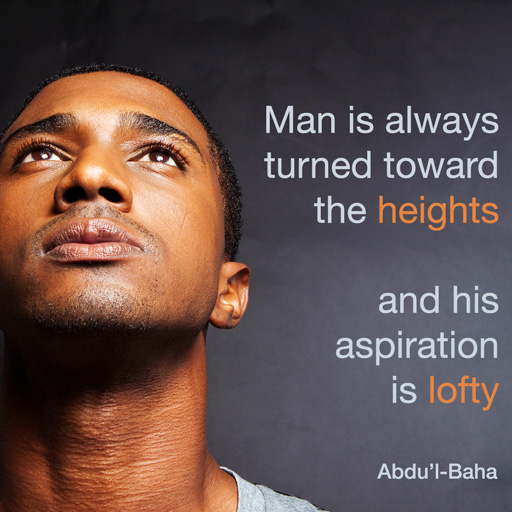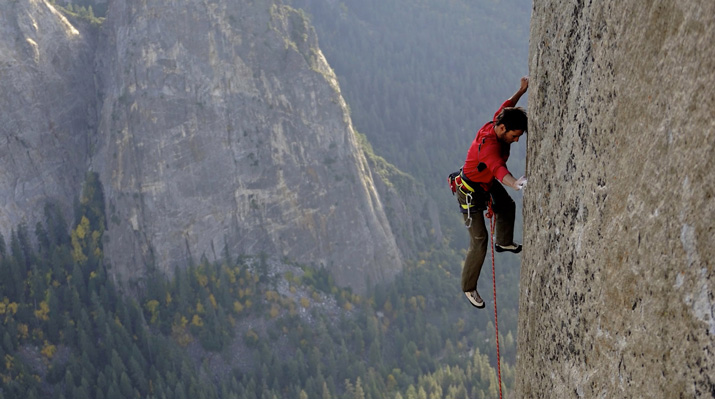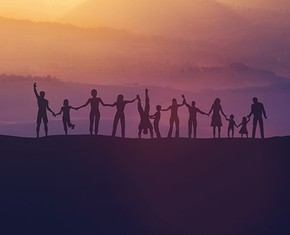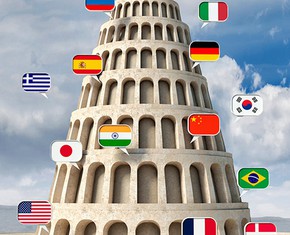The views expressed in our content reflect individual perspectives and do not represent the authoritative views of the Baha'i Faith.
…man is always turned toward the heights, and his aspiration is lofty; he always desires to reach a greater world than the world in which he is, and to mount to a higher sphere… – Abdu’l-Baha, Some Answered Questions, p. 188.
The other day, for the first time ever, two climbers free-climbed Yosemite’s Dawn Wall—the sheer, 3000-foot vertical cliff face that rock climbers view as the world’s hardest ascent. Their grueling, remarkable accomplishment made news all over the world.
Some of my friends, especially the climbers I know, reacted with awe and amazement. A few other friends said “What a waste of time and energy!”
On the same day, a social media post that showed a mother dog nursing a fawn went viral.
What do these seemingly disparate things have in common?
They both reveal, in different but strangely similar ways, one of our greatest and most powerful human desires—to transcend the limitations imposed on us by the constraints of the natural world. They both inspire us to new heights. They each ask us to look at our world and consider what’s possible, not just what currently exists.
People have always searched. We crave discovery, achievement, scientific breakthroughs and the experience of the new. We instinctively want to explore—the seas, the moon, the planets, the stars, our own molecular biology, the fluid boundaries of artistic expression and our own spiritual reality. By nature, we are seekers, adventurers, risk-takers, pioneers and pilgrims. That questing inner drive to constantly look for something new, many philosophers and theologians say, is what makes us human.
That’s why we celebrate and admire the deepest dive and the fastest speed and the highest free-fall and the most difficult climb—our souls always search for the limits, pushing us past boundaries and asking to see what’s over the next mountain.
And that’s part of the reason, I would suggest, why we’re so drawn to the pictures of cute baby animals and different species peacefully sleeping, playing and co-existing. When we see a cat and a dog taking a nap together, or a piglet and a kitten playing joyously, it makes us yearn for that kind of innocent, boundary-breaking connection in our own lives. Those popular internet memes symbolize something we each wish for—unity.
 We all want, in our inmost souls, to transcend the natural limitations imposed on us by this material world. We want to bridge the cultural, racial and religious divides that artificially separate us. Most of us harbor a deep hope that we can find ways to resolve our racial and national and political and religious differences, that we humans can one day build a society based on love, mutual respect and peace.
We all want, in our inmost souls, to transcend the natural limitations imposed on us by this material world. We want to bridge the cultural, racial and religious divides that artificially separate us. Most of us harbor a deep hope that we can find ways to resolve our racial and national and political and religious differences, that we humans can one day build a society based on love, mutual respect and peace.
So picturing different animals together symbolizes our deepest wish–that the power of love and kindness can someday rule our lives:
The light of love is more resplendent in the animal kingdom because the power of attraction whereby elements cohere and cellular atoms commingle now reveals itself in certain emotions and sensibilities which produce instinctive fellowship and association. The animals are imbued with kindness and affinity which manifests itself among those of the same species. – Abdu’l-Baha, The Promulgation of Universal Peace, p. 268.
But, despite the prophecy Isaiah promises in the Bible, can the lion ever really lie down with the lamb? Isn’t nature a continual fight for survival of the fittest, a place “red of tooth and claw?” Haven’t animals always fought and killed each other?
With that reality in mind, is it even remotely realistic to think that human beings can solve their traditional differences and develop global kindness and affinity? The Baha’i teachings say yes:
…indeed this world will become a paradise and the promised Day of God will dawn. Then according to the prophecy of Isaiah the wolf and the lamb will drink from the same stream, the owl and the vulture will nest together in the same branches and the lion and the calf pasture in the same meadow.
What does this mean? It means that fierce and contending religions, hostile creeds and divergent beliefs will reconcile and associate, notwithstanding their former hatreds and antagonism. Through the liberalism of human attitude demanded in this radiant century they will blend together in perfect fellowship and love. This is the spirit and meaning of Isaiah’s words. There will never be a day when this prophecy will come to pass literally, for these animals by their natures cannot mingle and associate in kindness and love. Therefore this prophecy symbolizes the unity and agreement of races, nations and peoples who will come together in attitudes of intelligence, illumination and spirituality.
The age has dawned when human fellowship will become a reality. – Abdu’l-Baha, The Promulgation of Universal Peace, p. 369.
The next time you’re scrolling through your Facebook feed or checking out the latest Instagram photos, and you see some cute baby animals playing together, think about this passage from the Baha’i teachings. Those pictures, and their extreme popularity, all symbolize “the unity and agreement of races, nations and peoples.”
Now it’s up to us to come together in attitudes of intelligence, illumination and spirituality.
You May Also Like
Comments


















Muchas gracias y larga vida.
David asks: "But, despite the prophecy Isaiah promises in the Bible, can the lion ever really lie down with the lamb?"
Why, yes, were the all time Baha'i champion around those cuddly little lambs today, to say nothing of wolves dressed as sheep:
The all time Baha'i champion, Martha Root, was named Lioness at the Threshold.
The prophecy above cited from the Promulgation of Universal Peace creates in my mind a peaceful lovely distant ...dream.
Where the rubber hits the road Abdu'l-Baha expands in detail as to how this Utopian zoological scenario will actually be achieved among people of good will. Here is where the Master brings the dream to reality:
“Therefore I request you also, non-Esperantists and fellow-Esperantists, to put your utmost exertion into the spread and promulgation of this language, because it will hasten that day, that millennial day, which has been prophesied by the past prophets and seers, that day in which, it is said, the wolf and the lamb will drink from the same fount, the lion and the deer graze in the same meadow. The signification of this Holy Writ is that the contesting races, warring nations, inimical religions, will come to each other in the spirit of love and amity -- then, the day-spring of that millennium; and every means, every instrument which confers unity and amity upon the children of men, that is love and that is the spirit. As we said, the greatest affair in this world is the reality of an auxiliary international language. The unification of language will transform the world of humanity into one world; the unification of language will do away with the misunderstandings between religions, and the unification of language will bring together the East and the West in the spirit of fellowship and love.”
Public address ‘Abdu’l-Bahá, Edinburgh, 7 Jan 1913; published Chicago, Star of the West Vol 11 No 18 p 302 (outer Vol 6) 7 Feb 1921.
Baha'i love.
Paul.
PS During the interbellum Martha's focal point for teaching the Faith was the annual world congress of Esperanto.
Silly me, I nearly forgot to conventionally tie it all together.